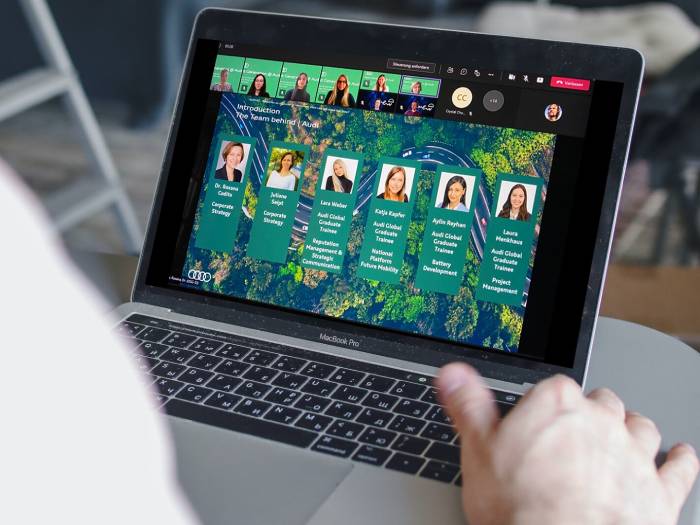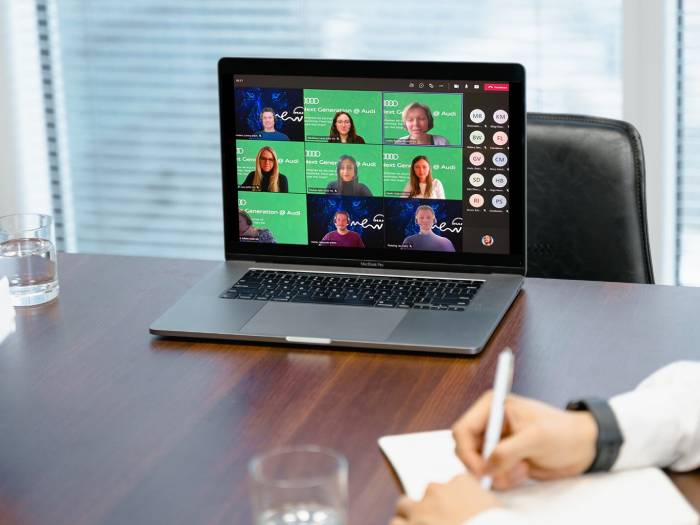Audi Next Generation: young people's ideas for more sustainable production
Implementing closed material cycles along the entire value chain, especially in battery production, to contribute to decarbonization: sustainability ideas at Audi also come from "Next Generation" dialogues.
To make production increasingly sustainable, the implementation of cycles or closed-loop concepts for materials, which save resources, is essential.
In this area, Audi also relies on the innovative ideas of young stakeholders who regularly get together as part of the "Next Generation" dialogue series, exchanging views on many topics concerning sustainability. From these meetings come strategic ideas for Audi's future.
Exchanging ideas

Since 2020, "Next Generation" has been promoting the continuous exchange of ideas between Audi and young people on strategic topics in the areas of ESG (environmental, social, governance), sustainability and corporate social responsibility. Participants are apprentices, interns and trainees from all Volkswagen Group brands or One Young World ambassadors from Audi’s Environmental Foundation.
The ideas that come out of these dialogues are insights that are then shared with the relevant departments: they are not 'turnkey' solutions, but ideas from which to derive forward-looking strategies and innovative concepts based on the results.
Global and local
"The goal of Audi 'Next Generation' is to enter into dialogue with motivated young people inside and outside the company, to develop innovative ideas, to discover potential for improvement, and to question existing ways of thinking. We would like people who are actively dealing with sustainability issues in the places where they live to have their say. The conversations that arise in this way are the ones that live on as long as possible, even beyond the workshops. This is the only way to shape a better future together, both globally and locally", explains Roxana Codita, who is in charge of Corporate Strategy and ESG topics at Audi.
The future of batteries
"How do we create a closed loop for batteries?" was the question that two virtual workshops held as part of the "Next Generation" dialogues tried to answer. Forty young employees from different brands and locations of the Volkswagen Group discussed the topic "Batteries as a source of resources: how can we close the loop?".
The exchange between One Young World (OYW) ambassadors and trainees from the Volkswagen Group was intensive, and aimed to try to develop innovative approaches on how to make battery production as sustainable as possible and to try to define the requirements needed to create a global recycling system to close the battery loop in the long term.
Closed cycles along the value chain

Closed loops can be implemented at different points in the automotive value chain: from product design to procurement, manufacturing to marketing, and reuse and recycling. After all, to maximize the potential of the circular economy, the entire value chain needs to be examined and rethought.
Closed material cycles are critical for electric mobility, especially in battery production, because they allow batteries to be recycled and valuable raw materials to be reused. Audi is part of the Global Battery Alliance to actively contribute to the establishment of a sustainable value chain for batteries also beyond its own Group.
Positive effects of closed cycles
The positive effects of a local, self-contained circular economy are potentially enormous. Consistent use of renewable energy across the entire value chain and the development of innovative recycling processes for batteries are significant levers for further reducing the carbon footprint. The biggest challenges posed by the future are not only climate change or limited availability of raw materials, but also dependence on complex supply chains and the ethics of supply chains.
The circular economy is therefore strategically critical for several reasons. One is the priority given by financial market investors to climate change and scarcity of resources. In addition, the circular economy has great potential both in terms of profit and decarbonization, stimulates competition, and enables a company's resilience to be increased while reducing dependence on highly complex supply chains - an aspect that emerges clearly in times of crisis.
Recycling according to Audi

Reduce, reuse, recycle, rethink: a self-contained economic cycle is one of the keys to producing batteries efficiently, preserving resources and accelerating the decarbonization of mobility. But it is also essential to develop a holistic approach to the reuse of the batteries and the targeted recovery of raw materials. And these were precisely the topics at the heart of the exchanges between participants in the two 'Next Generation' workshops, thanks to which many ideas were gathered for further exploration and implementation.
"I really enjoyed the workshop. It was a great opportunity to exchange existing knowledge, experiences and new ideas with other participants", says Lyubov Artemenko, One Young World Ambassador in 2019 and co-founder of GO TO-U, a digital platform dedicated to electric vehicle charging. "I was part of the Eastern Europea team and we focused on the great economic opportunities arising from reusing lithium-ion batteries, particularly for energy storage applications. We addressed a coherent approach for the entire Volkswagen Group to create closed loops for recycling".
Organizational challenges
"Audi Next Generation was born in 2020, at the height of the pandemic, in the Corporate Responsibility Department in the area of stakeholder management, thanks to a team of trainees from the Audi Graduate Program. Since then everything has been done digitally. It has been a new experience for everyone, but very informative. The fact that people from all over the world are participating gives us authentic insight into local problems, but it also makes planning and implementation complex because of the different time zones", tell Laura Menkhaus and Katja Kapfer of the Audi Global Graduate Program and participants in the "Next Generation" project team.
"Our biggest aspiration is to give young people a voice and to influence Audi's long-term policy. Only by efficiently using the synergies and potential within the company, helping to answer the questions and challenges of each department, can sustainable changes be achieved", concludes Diana Rotter, from the Audi Global Graduate Program and project team participant.
Source: AUDI AG
VGI | Responsible OU: VP | Creation date: article date | Class 9.1
